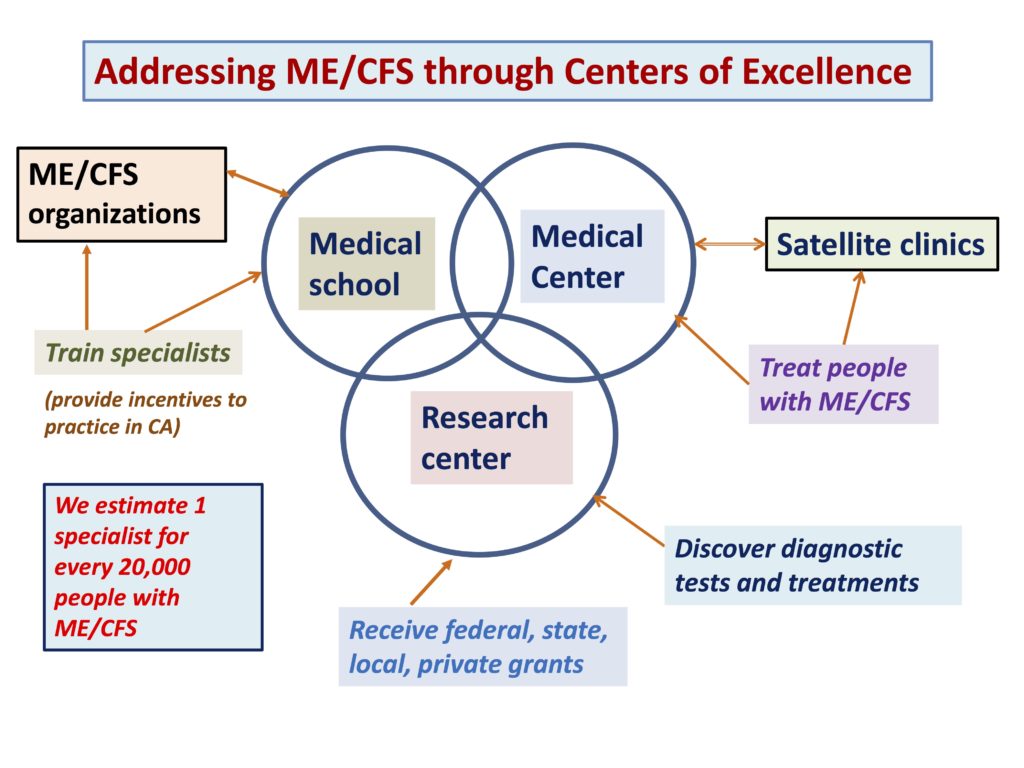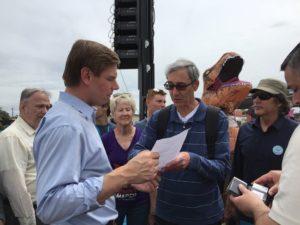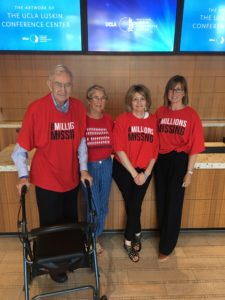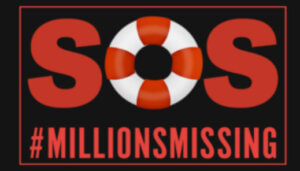California advocates for myalgic encephalomyelitis (ME) are fighting for the state to institute a statewide Centers of Excellence program that would train ME specialists, provide state-of-the-art treatment for people with ME, and undertake advanced research. Activists across the state have already met with 24 state legislators to discuss this initiative.
Activist and parent of a daughter with ME, Art Mirin, from the Bay Area developed the idea for the Centers of Excellence program. #MEAction is pleased to announce that Art will be acting as our Advocacy Co-Chair for #MEAction’s California State Chapter, along with Beverly Weiss from Pasadena, Southern California. Art and Bev have been active in advocating for people with ME for the past several years, and will continue their work and vision for California through the formal support of our State Chapter program.
#MEAction USA’s State Chapters aim to build local capacity around volunteer engagement, congressional outreach, local and state advocacy, and medical education, and support awareness raising efforts for ME. Our state chapters will also act as laboratories to incubate new ideas for advocacy and outreach: successes in one state can be shared and propagated across the country. We want to build a strong, national, distributed network of patient activists and allies to grow the movement for health equality.
Read our interview below with Art and Bev about their vision for improving the lives of people with ME in California and beyond. Get involved with #MEAction California via our Facebook group and monthly calls.
What is your vision for improving the lives of people with ME in California?
Our primary focus has been to get California to pass the necessary legislation to help the 100,000 to 300,000 Californians with ME. The centerpiece of our efforts is a statewide Centers of Excellence program, which would involve the training of specialists, clinical care, and closely coupled research. With there being only half a dozen or so bona fide clinicians in California, it is critical to get this program off the ground as soon as possible.
We have now met with roughly 24 state legislative offices, with current focus on members of the respective Health Committees. We have identified a number of supporters and are approaching the critical mass necessary for the enactment of legislation. We have been interacting with Stanford (which already treats people with ME and performs ME research), and the University of California (which we are trying to get to treat people with ME and to support the Centers of Excellence program).

What is your long-term vision – where would you like CA to be in 5 years in relation to ME?
We would like to see California be the leader – the state that others will emulate – though we would be equally happy to join with other states in a national leadership role.
We want California to provide expert clinical care for all who need it and to be looked toward for the latest leading edge research. We want health care providers to be familiar with ME so that patients are treated properly and effectively at all levels.
We want medical schools to include ME in their core curriculum, and be an environment in which medical students want to and are encouraged to help those with ME.
Why is California important in relation to other states?
California represents one-eighth of the US population. Anything that California does will gain national attention. California’s proactiveness will greatly increase the chance of federal action, which is desperately needed.
Describe your personal relationship to ME. How long have you been doing advocacy work? What brought you to #MEAction, and why are you interested in being the advocacy co-chair?

Art: My daughter has had ME since 2004. In 2016 I attended a #MillionsMissing demonstration in San Francisco, and that marked the beginning of my advocacy work. Though no real background in medicine or biology, I found that my scientific research background could be of help in the advocacy effort. I have been performing State advocacy work for over 2 years and have served informally in a leadership role. With #MEAction being the leading ME advocacy organization in the world, serving as advocacy co-chair seemed like a natural role. I have been working with Beverly for roughly a year and am delighted with the idea of sharing this responsibility with her.
Bev: My daughter also became ill in about 2004 and was diagnosed at Stanford about 3 years ago. My daughter has been home-bound for the past 2 years. Even though I am not a caregiver, and do not live with her, she is always with me. I had the need to help, and found Open Medicine Foundation and the #MEAction Network. I started to volunteer with #MEAction in early 2018 and was assigned to work with the incredible Congressional team.
I knew about the clinical care crisis for ME/CFS patients and learned about the excellent California ME/CFS Initiative authored by Art Mirin, and his efforts to enact this legislation. There was no one advocating with legislators in Southern California and I thought I could use what I learned on the #MEAction congress team to that effort. This work is outside of my comfort zone (I have worked behind a computer for over 20 years), but I was fighting for my daughter’s life and that of the other truly incredible ME/CFS persons I have met while advocating. Art and I have worked well together. He is responsive, dedicated and is a relentless advocate. As for my role as Southern California Co-Advocacy chair, I continue to do what I have been doing for the last 5 months – trying to meet as many legislators as I can and spreading the word about the clinical care crisis for ME/CFS persons in Southern California.

What has been most challenging about undertaking ME advocacy work?
Art: Aside from the time necessary to do a good job, dealing with the high failure rate (e.g., media not responding, legislative aides not responding, NIH and CDC not doing what they should, society not seeming to care) can be a challenge. Fortunately, I am always able to regroup, stand up, and plan the next step.
Bev: Motivating our community to help advocate for improved clinical care for Californians with ME. We need constituents to ask their legislators, whose job it is to represent them in Sacramento, to support our ME/CFS legislation. This can be done by signing on to our requests for a meeting, participating in our calls or calling legislators’ offices directly.
What gives you hope?
Art: We continue to have small successes. We are encountering more people who care, and more and more legislators who are willing to lend their support.
Bev: I feel that we are educating everyone we meet about ME. At one of the legislator meetings, they initially thought ME was narcolepsy. I played bridge with a retired doctor, and when I first brought up ME, I could see he thought is was psychological and recommended my daughter swim for at least one hour every day. He was kind and read the materials I brought him each week. He eventually dumped me as a bridge partner, but offered to have brochures in his office, and has since diagnosed 2 patients with ME and asked me for the names of ME Specialists.





